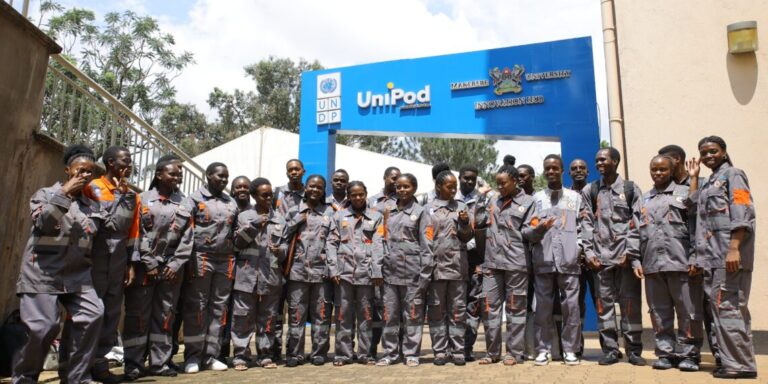Makerere University Vice Chancellor Prof. Barnabas Nawangwe Represented by Prof. Buyinza Mukadasi, Acting Deputy Vice Chancellor (Academic Affairs), Kiira Motors Corporation (KMC), Executive Chairperson Prof. Tickodri-Togboa, and the United Nations Development Programme (UNDP) Resident Representative Ms. Nwanne Vwede-Obahor have launched a skilling program to equip Makerere University students with skills in electric mobility and associated technologies for industrial uptake.
25 students from Makerere University were selected from Electrical, Biomedical, Software, Mechanical, Computer Engineering, and Bachelor of Science in Physics courses. Of the selected students, 12 are female and 13 are male. They were selected in a competitive process where only those with grades in the first and second upper classes were subjected to interviews and the top 25 were subsequently enrolled. If they remain focused and successfully complete the one-year training period, they will become Kiira Motors Corporation Associate Researchers.
Kiira Motors Corporation, an automotive industry leader advocating for sustainable mobility solutions across the continent, has been acknowledged as a pioneering entity in bridging thegap between innovation and market viability. KMC was identified as the industry partner tooffer specialized training and skilling in Electric Vehicle Technologies to impart specialized
skills to students in Electric Vehicle Technologies, Engineering Design and other related fields at the Makerere University Innovation Pod (Mak-UniPod).
The main objectives of the skilling program include:
1) Equipping participants with foundational knowledge in electric vehicle technology, renewable energy systems, battery cell technology, smart grid systems, and electric vehicle powertrains.
2) Fostering practical skills development through hands-on training and project-based learning, enabling participants to apply theoretical knowledge to real-world scenarios.
3) Promoting innovation and problem-solving by exploring innovative solutions and tackling complex challenges in clean energy technologies.
4) Facilitating career readiness by preparing participants for careers in electric vehicle technologies and interlinkages with industry.
“The Mak-UniPod is a place where research comes to reality,” said Makerere University Vice Chancellor Prof. Barnabas Nawangwe. “It is here where students and young people come toput their novelty into a product. From here, many companies will emerge and with suchprograms, students will be able to design for products that meet the industry needs. I appreciate UNDP for partnering with us to put up such a facility under the Timbuktoo initiative.”
The scope of the skilling program will encompass a comprehensive range of subjects, including fundamental concepts in electric vehicle technology, renewable energy technologies, fuel cell technology, smart grid systems, and hands-on training with ElectricVehicle Powertrain workbenches.
“This program serves to equip users with the knowledge and expertise necessary to address contemporary challenges in the automotive industry while promoting innovation and entrepreneurship in the sector,” said Kiira Motors Corporation Chief Executive Officer Eng.
Paul Musaazi. “It will also create critical human resource mass to be absorbed by KMC and similar entities.”
UNDP Resident Representative Ms. Nwanne Vwede Obahor added that “The skilling program aligns with global trends toward net-zero transition so as to keep the global temperature increase below 1.5°C as stipulated in the Paris Agreement on climate change.
In 2024, the transport sector emitted 8.24 billion metric tons (GtCO₂), accounting for roughly 21 percent of global CO₂ emissions that year. The transport sector is therefore a crucialarea of intervention in combating climate change.”
The curriculum covers electric vehicle (EV) basics, such as the use of battery-powered electric motors and various charging options, including Level 1 (standard home outlets), Level 2 (240-volt outlets), and DC Fast Charging. With Africa facing challenges like rapid urbanization, population growth, and the need for clean energy solutions, adopting electric vehicles offers a transformative opportunity to address these issues, reduce fossil fuel dependence, and support a sustainable future.
The Mak-UniPod is a multidisciplinary innovation space which is fully equipped to support research and development by not only Makerere University students and faculty, but alsoyouth outside the university through nurturing Uganda’s innovation ecosystem. The Mak-UniPod was established by UNDP Africa’s Timbuktoo initiative which is a joint initiative of UNDP and Africa Influencers for Development (AI4D). Timbuktoo represents a commitment to leverage and catalyze current opportunities in Africa’s startup space and by doing so ensure a sustainable, inclusive, and transformational outcome for youth innovators and entrepreneurs in Africa.


